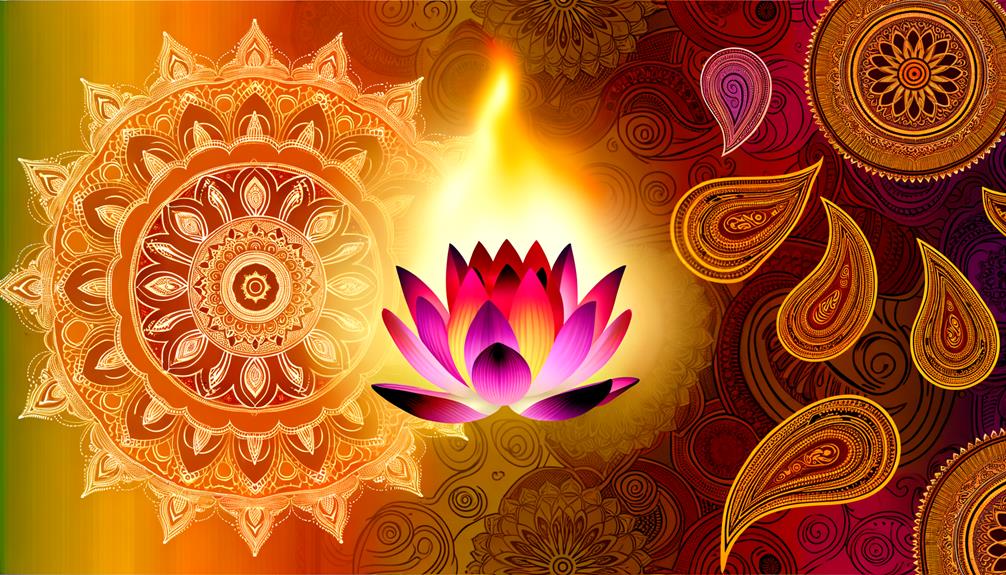Anurag Name Meaning in English
The name 'Anurag' originates from the Sanskrit language and holds profound meaning in English, signifying deep affection, love, or devotion. Etymologically, it combines 'anu' (subsequent) and 'raga' (color, passion, love), reflecting strong emotional and spiritual values.
Culturally, 'Anurag' is revered in Indian traditions and is frequently found in ancient texts and religious scriptures. It encapsulates both historical significance and modern interpretations of empathy and emotional depth.
Notable individuals bearing the name include filmmaker Anurag Kashyap and biologist Anurag Agrawal. For a thorough exploration of its multifaceted implications, further insights await.

Key Takeaways
- 'Anurag' means deep affection, love, or devotion in English.
- The name originates from the Sanskrit words 'anu' (following) and 'raga' (color, passion, love).
- It symbolizes emotional and spiritual values in Indian tradition.
- Historically, 'Anurag' signifies deep emotional connections and attachment in classical Indian literature.
- In modern contexts, it represents empathy and the ability to manage emotions effectively.
Origin and Etymology
The name 'Anurag' originates from the ancient Sanskrit language, and its etymology can be traced back to classical Indian literature and Hindu philosophy.
The term is composed of two primary components: 'anu' and 'raga'. 'Anu' generally signifies 'following' or 'subsequent', while 'raga' translates to 'color', 'passion', or 'love'.
In this scenario, 'Anurag' embodies the essence of deep affection, love, or attachment. This term is frequently employed in literary and philosophical works to denote a profound, emotional connection.
It is worth noting that the name holds significant cultural and spiritual connotations, often reflecting virtues such as devotion and compassion.
Understanding the origin and etymology of 'Anurag' offers insight into its rich cultural and historical significance.
Sanskrit Roots
The name Anurag finds its origins deeply embedded in Sanskrit, an ancient and revered language of India.
Etymologically, it is derived from the word ‘anurāga,’ which signifies affection, devotion, or attachment. In Indian culture, the name Anushka is often associated with love and affection. The meaning of the name Anushka holds great significance in expressing the emotional bond between individuals. In the Hindu tradition, names are chosen carefully to reflect the qualities and values that parents wish to instill in their children, and the meaning of the name Anushka embodies the ideal of deep love and connection.
This name carries substantial cultural significance, reflecting the profound emotional and spiritual values prevalent in Indian tradition.
Origins and Etymology
Rooted deeply in Sanskrit, the name Anurag is imbued with a rich tapestry of cultural and historical significance. Etymologically, the term “Anurag” derives from the combination of 'anu' (अन्) meaning 'towards' and 'raga' (राग) signifying 'attachment or love'. This amalgamation conveys a profound sense of passionate affection and emotional intensity.
In classical Sanskrit literature, “raga” often relates to the concept of melodies and emotional expressions, thereby enriching the name with layers of artistic connotations. The usage of Anurag in ancient texts underscores its timeless nature, reflecting a deep-rooted connection to human emotions and relationships.
The name encapsulates an essence that bridges the personal and the poetic, offering a nuanced understanding of affection and attachment.
Cultural Significance
Expanding upon its etymological roots, the cultural significance of the name Anurag in Sanskrit encompasses not only personal affection but also a broader societal appreciation for emotional depth and artistic expression.
In Sanskrit literature, Anurag is often associated with intense love, devotion, and a deep-seated emotional connection that transcends mere physical attraction. This name is frequently used in classical poetry and music to convey the profound emotional resonance that characterizes human relationships and artistic endeavors.
The term embodies a philosophical ideal, reflecting a state of being where one is deeply moved by beauty and emotional experiences. The name Anurag signifies a rich cultural heritage that values emotional intelligence and aesthetic sensitivity.
Meaning in English
Deriving from the ancient Sanskrit language, the name 'Anurag' carries a profound meaning in English, often translated to signify deep affection, love, or devotion.
The etymology of 'Anurag' is rooted in the combination of two Sanskrit words: 'Anu,' meaning 'towards,' and 'Raga,' meaning 'passion' or 'melody.' When amalgamated, these elements denote an intense, enduring emotional connection.
This semantic richness encapsulates both romantic and platonic dimensions of love, emphasizing a sense of earnest commitment and heartfelt sentiment.
The term is multifaceted, extending beyond mere emotional expression to encompass notions of loyalty, reverence, and a deep-seated bond. Therefore, 'Anurag' conveys a nuanced, layered understanding of affection and devotion in the English language.
Cultural Significance
The name Anurag holds substantial cultural significance, deeply rooted in historical contexts and traditions across various Indian communities.
Its frequent appearance in classical literature and poetry underscores its symbolic representation of deep affection, attachment, and love.
Analyzing its usage in these literary works provides insight into the values and emotions revered in these cultures.
Historical Contexts and Traditions
Rooted deeply in Indian culture, the name Anurag carries significant historical and traditional value, embodying concepts of deep affection and devotion. The historical relevance of Anurag can be traced back to ancient scriptures, where it frequently appears in verses celebrating love and divinity. Tradition holds that naming a child Anurag invokes a sense of warmth and emotional depth, often associated with the nurturing bonds within families and communities. This name's persistent use throughout generations reflects its enduring cultural resonance.
| Historical Context | Traditions | Cultural Value |
|---|---|---|
| Ancient Scriptures | Naming rituals | Emotional depth |
| Celebrated in verses | Family bonds | Warmth and love |
| Love and divinity | Community ties | Enduring resonance |
The table highlights Anurag's multifaceted cultural significance.
Symbolism in Literature
In literature, Anurag often symbolizes profound emotional connections and spiritual devotion, reflecting its deep cultural roots and historical significance. This name embodies the essence of love and affection, often serving as a literary device to explore themes of devotion, both romantic and divine.
Authors frequently employ Anurag to evoke a sense of deep, enduring attachment, thereby adding layers of meaning to character relationships and narrative arcs. Its cultural significance is rooted in classical Sanskrit literature, where Anurag is associated with divine love and eternal bonds.
Historical References
Numerous historical texts and scriptures have referenced the name 'Anurag,' highlighting its significance in various cultural and religious contexts.
In ancient Sanskrit literature, 'Anurag' is often associated with deep emotional connections and is frequently used in poetic expressions to denote love and passion.
Religious scriptures, such as the Bhagavad Gita, cite 'Anurag' in the context of divine love, illustrating the bond between devotees and the divine.
Historical records from the Gupta and Maurya periods also reveal that the name was prevalent among royals and scholars, reflecting its esteemed status.
This consistent appearance across diverse texts underscores 'Anurag's' enduring relevance and its deep-rooted cultural significance in Indian history.
Common Usage
The name 'Anurag' is frequently used in contemporary India, not only as a given name but also in various forms of art and literature to convey emotions of love and affection.
In literary contexts, 'Anurag' often symbolizes deep emotional bonds and romantic attachment, appearing in poetry, novels, and songs.
In everyday usage, it is a popular choice for male infants, highlighting cultural and familial values centered on love. The name's appeal is further reinforced by its phonetic simplicity and meaningful depth, making it a preferred option across diverse linguistic and regional backgrounds in India.
Additionally, 'Anurag' is commonly used in media and entertainment, often attributed to characters that embody warmth and emotional intelligence.
Variations and Nicknames
Building on its widespread usage, 'Anurag' also presents a variety of variations and nicknames that reflect regional linguistic nuances and personal preferences. These variations can be attributed to phonetic differences, cultural influences, and individual creativity. Here are some notable variations and nicknames:
| Variation | Region/Culture | Common Usage |
|---|---|---|
| Anuraag | Northern India | Formal |
| Anu | Pan-India | Informal |
| Raghu | Southern India | Casual |
| Ragu | Western India | Affectionate |
Such variations not only signify the adaptability of the name 'Anurag' but also demonstrate its emotional resonance across different cultures. Understanding these variations can provide deeper insights into the name's cultural significance, enhancing both personal identity and social connection.
Famous Personalities
Frequently, the name 'Anurag' is associated with distinguished individuals across various fields, reflecting its enduring popularity and cultural importance. This name has been borne by luminaries in cinema, academia, and technology, each contributing uniquely to their respective domains.
- Anurag Kashyap: A renowned filmmaker and screenwriter, Kashyap is celebrated for his contributions to Indian independent cinema, known for films like 'Gangs of Wasseypur' and 'Black Friday.'
- Anurag Agrawal: A prominent biologist and professor, Agrawal's research in ecology and evolutionary biology has garnered international recognition.
- Anurag Dikshit: Co-founder of PartyGaming, Dikshit played a pivotal role in the online gaming industry, greatly impacting its global expansion.
These individuals exemplify the diverse potential and accomplishments associated with the name 'Anurag'.
Literary Mentions
Literary works often feature the name 'Anurag', symbolizing love, passion, and deep emotional connections, thereby enriching the narrative with profound cultural undertones.
In Indian literature, 'Anurag' frequently appears in poetry and prose, highlighting the intrinsic virtues of devotion and affection. Classic texts utilize the name to evoke a sense of enduring emotional ties, often serving as a central motif in romantic and familial relationships.
The name's repeated use in various literary genres underscores its significance in reflecting societal values and emotional depth. This thematic presence not only enhances character development but also provides readers with a nuanced understanding of interpersonal dynamics within the cultural context.
Therefore, 'Anurag' continues to be a potent literary device in exploring human emotions.
Modern Interpretations
In contemporary contexts, the name 'Anurag' has evolved to embody not only traditional connotations of love and passion but also modern values of empathy and emotional intelligence. This evolution reflects a broader societal shift towards recognizing the importance of emotional depth and interpersonal understanding. The name Anurag, thus, symbolizes a harmonious blend of time-honored and contemporary virtues.
- Empathy: Anurag now signifies a heightened awareness of others' emotions, fostering deeper connections.
- Emotional Intelligence: It stands for the ability to manage one's own emotions while maneuvering social complexities effectively.
- Adaptability: The name captures the essence of evolving personal traits that align with modern psychological and social frameworks.
This multifaceted interpretation makes 'Anurag' a name that resonates well in today's diverse and dynamic world.
Conclusion
Coincidentally, the name 'Anurag' intertwines rich cultural significance, historical references, and literary mentions, all rooted in its profound Sanskrit origins.
Its translation as 'affection' or 'love' in English encapsulates a timeless human experience, making it a name with universal appeal.
The name's variations and use by famous personalities further amplify its resonance.
Through modern interpretations, 'Anurag' continues to evoke a sense of endearment and connection, solidifying its enduring presence across cultures and generations.






